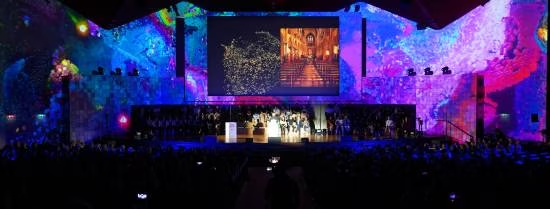The academic year 2022-2023 of Erasmus University Rotterdam was opened on September 5th. The theme ‘AI and us: imagining the future’ provided a special programme in which science, art and artificial intelligence (AI) got together.
Artificial intelligence (AI) offers unprecedented opportunities but also has risks. How do we deal with this as a university and society? And what is the role of art and science in this? In the special and interactive meeting, various perspectives on this were featured. The visual highlight was undoubtedly the digital data-driven art of Refik Anadol, who overwhelmed the attendees with his art on enormous screens.
Rotterdam writer and performer Elfie Tromp hosted the event and singer-songwriter Meau (known for her number 1 hit ‘Dat heb jij gedaan’) provided the music. The opening took place in the Aula of Erasmus University Rotterdam and was livestreamed simultaneously with real-time subtitles in Dutch, translated by AI.
Why AI is EUR’s business
To start, Ed Brinksma explained what AI means for our university: “Most people associate AI with science and technology, but the effects and the most important implications and use of technology will be with people, societies and cultures. It will deeply influence us.” The impact on ordinary people, society and behaviour are very important topics for Erasmus University Rotterdam, and so AI also is, Brinksma argued.
AI: where algorithm and imagination meet
Francisca Grommé, Top Talent Fellow in Erasmus-initiative AiPact, elaborated on why there is so much hope and hype around AI. “When we talk about AI, we often talk about ourselves and the limits of human capacity. AI is at the same time real, and it contains large parts of our imagination. This attracts our fascination but it also poses challenges”, she stated. “It can pay off to not only train algorithms but also to train our imaginations.”

Refik Anadol’s AI art
Refik Anadol is a world-leading artist who breaks boundaries between the physical and digital with data-driven machine learning. He talked about his inspirations and way of working, while his dreamlike art was displayed on huge screens in the Aula.
Works of art, he argued, are much more powerful, impactful and purposeful when the art is for everyone, regardless of age or background. That explains his focus on public art, with projections on buildings and immersive rooms. “I believe that when art is everywhere in public, free and open, that’s where the impact can happen,” he says.
“AI is having an impact in society, but I think we are at the stage where we are asking: what else can we do with it and how can we bring curiosity, inspiration and optimism into our future?” he concluded his keynote speech.

AI in Rotterdam
In two panel discussions, various topics around the theme were explored in relation to our university and city. Farshida Zafar, director of the ErasmusX initiative, showed how you can create positive societal impact with art and AI combined. With Rotterdam citizens the researchers of AICON make art for a digital galleries, and the profits go back to the communities. Said Kasmi, alderman of education in Rotterdam, sees the importance to educate students about AI to keep and secure talent in Rotterdam, since 25% of the jobs in our city are in some way connected to AI, and this number will even grow larger.
How will AI transform the way we work in the future? Tessa Boumans, PhD student at AiPact, studies new technologies in the fashion industry and how they affect sustainable working conditions. EUR alumnus Tomas Moska emphasized the importance for students to be active and learn about tech through practice. “In university you have the freedom to fail and start again”, he experienced himself.
Award ceremony
As always, the Opening of the Academic Year is the moment to award prizes to outstanding members of our academic community. Rector magnificus Annelien Bredenoord awarded the Education Award 2022 to Marloes Nederhand (assistant professor Erasmus School of Social and Behavioural Sciences), who created considerable societal impact by continuously emphasizing the importance of education in research designs, teaching, management and policy making.
Chairman of Erasmus Trustfund Michiel Muller awarded The Student Societal Impact Award 2022 to GIDS, an agency that connects students with parties in society and vice versa.
The Rotterdam Thesis Award was won by Ingrid Blankesteijn for her thesis ‘The Elephant in the Treatment Room; acknowledging and treating the consequences of racism and mental and physical health’. In a video message, she expressed the wish to inspire other students to write society inspired theses.
Lastly, vice chair of the Executive Board Ellen van Schoten awarded the Sustainability Award to the Eurekaweek Board, who made over 5000 students aware why sustainability is so important with measures from reusable ponchos to bottles for tap water.

Gesamtwissenschaft and the importance of arts
Ed Brinksma, chairman of the Executive Board and professor in Computer Science, drew the comparison between the Gesamtkunst of the Bauhaus academy from a century ago, to the collaborations the Erasmus University Rotterdam is active in nowadays. The Convergence Alliance with Delft University of Technology and Erasmus Medical Centre could be called Gesamtwissenschaft. The Cultuur&Campus institute that is currently developing in Rotterdam South together with the arts academies of Willem de Kooning and CODARTS is another example.
“As today’s programme has convincingly shown, the arts provide a powerful medium between the intricacies of the sciences and technology and the social fabric of society and its rich variety of individuals. It will be essential to make the products of AI visible, approachable and imaginable in completely new ways.”
- Related content

